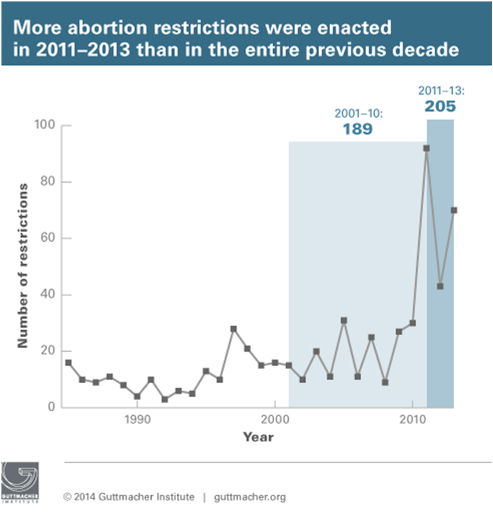
Today marks the 41st anniversary of the Roe v. Wade decision. On January 22, 1973, the Supreme Court issued a decision upholding a person’s right to privacy and abortion. In a 7-2 decision, the Court decided that under the due process clause of the 14th Amendment, a person had the right to access an abortion before a fetus was deemed viable or had the ability to live outside the womb, usually 24-28 weeks gestation.
The case originated in Texas when the plaintiff, Norma McCorvey aka ‘Jane Roe’, discovered she was pregnant with her third child. While she wanted to seek a safe and legal abortion for her unplanned pregnancy, she was unable to get one without claiming that the pregnancy was a result of rape because the laws in Texas only allowed access to an abortion in the cases of rape or incest. After hearing McCorvey’s situation, two young lawyers, Sarah Weddington and Linda Coffee decided to file suit on her behalf against the Dallas County District Attorney Henry Wade. Originally, the district court ruled in McCorvey’s favor, but did not issue an injunction against the laws barring her from accessing an abortion. McCorvey subsequently continued the pregnancy and never had an abortion.

The case was then appealed to the Supreme Court and the decision asserted that according to the 14th Amendment, people seeking abortions had the right to privacy because of the right to personal liberty, therefore are protected by the Constitution. In response his disagreement to the Roe v. Wade decision, Illinois Republican Congressman Henry Hyde put forth the Hyde Amendment banning the use of federal funds for abortion, except in the cases of the life of the pregnant parent. This amendment banned access to abortion to anyone who depended on the federal government for healthcare including Medicaid recipients, military families, AmeriCorps and PeaceCorps members, federal employees, and the incarcerated. When crafting the amendment, Congressman Hyde stated, “I certainly would like to prevent, if I could legally, anybody having an abortion, a rich woman, a middle-class woman, or a poor woman. Unfortunately, the only vehicle available is the…Medicaid bill” indicating that he could legally only bar low-income people from accessing abortion.

Opponents noted that this policy created a separate system of health care access and freedom of choice that was dependent on your income level. “If we now restrict or ban Medicaid funding for abortions, the government will accomplish for poor women indirectly what the 1973 [Supreme Court] opinion expressly forbade it to do directly…a right without access is no right at all,” said then-Republican Massachusetts Senator Edward Brooke. When the constitutionality of the Hyde Amendment reached the Supreme Court, and was upheld, Justice Thurgood Marshall issued a dissenting opinion stating, “The Hyde Amendment is designed to deprive poor and minority women of the constitutional right to choose abortion.” While the policies of the Hyde Amendment have been expanded to cover abortions for survivors of rape and incest, in addition to health, barriers still exist and continue to create a stigmatized two-tiered system of healthcare for low-income individuals and employees of the federal government.
 While fifteen states currently allow funds to be used to cover abortion for those on state Medicaid programs and employees of the state, more and more states are restricting access to abortion. The Hyde Amendment, and an executive order by President Barack Obama, also ban the use of funds to pay for abortions through the Medicaid expansion of the Affordable Care Act. It is estimated that in 2022, over 21.3 million people will access health care through Medicaid. Since 2011, over 205 restrictions have been enacted – more than the last decade combined. Most states are creating a patchwork of legislation, creating 20-week bans in one state, while attempting 6-week bans in others. Both have been ruled unconstitutional, but anti-abortion activists are seeking appeals. It is the hopes of anti-abortion activists that the varied laws will inevitably force the case back to the Supreme Court.
While fifteen states currently allow funds to be used to cover abortion for those on state Medicaid programs and employees of the state, more and more states are restricting access to abortion. The Hyde Amendment, and an executive order by President Barack Obama, also ban the use of funds to pay for abortions through the Medicaid expansion of the Affordable Care Act. It is estimated that in 2022, over 21.3 million people will access health care through Medicaid. Since 2011, over 205 restrictions have been enacted – more than the last decade combined. Most states are creating a patchwork of legislation, creating 20-week bans in one state, while attempting 6-week bans in others. Both have been ruled unconstitutional, but anti-abortion activists are seeking appeals. It is the hopes of anti-abortion activists that the varied laws will inevitably force the case back to the Supreme Court.
While abortion is technically legal, the access to it is crumbling, and our current policies are barriers to access that wealthier people do not have to incur. As abortion advocates on both sides take various laws to court, we will inevitably see a new Roe v. Wade in the near future, but this time, we don’t know how it will turn out.






